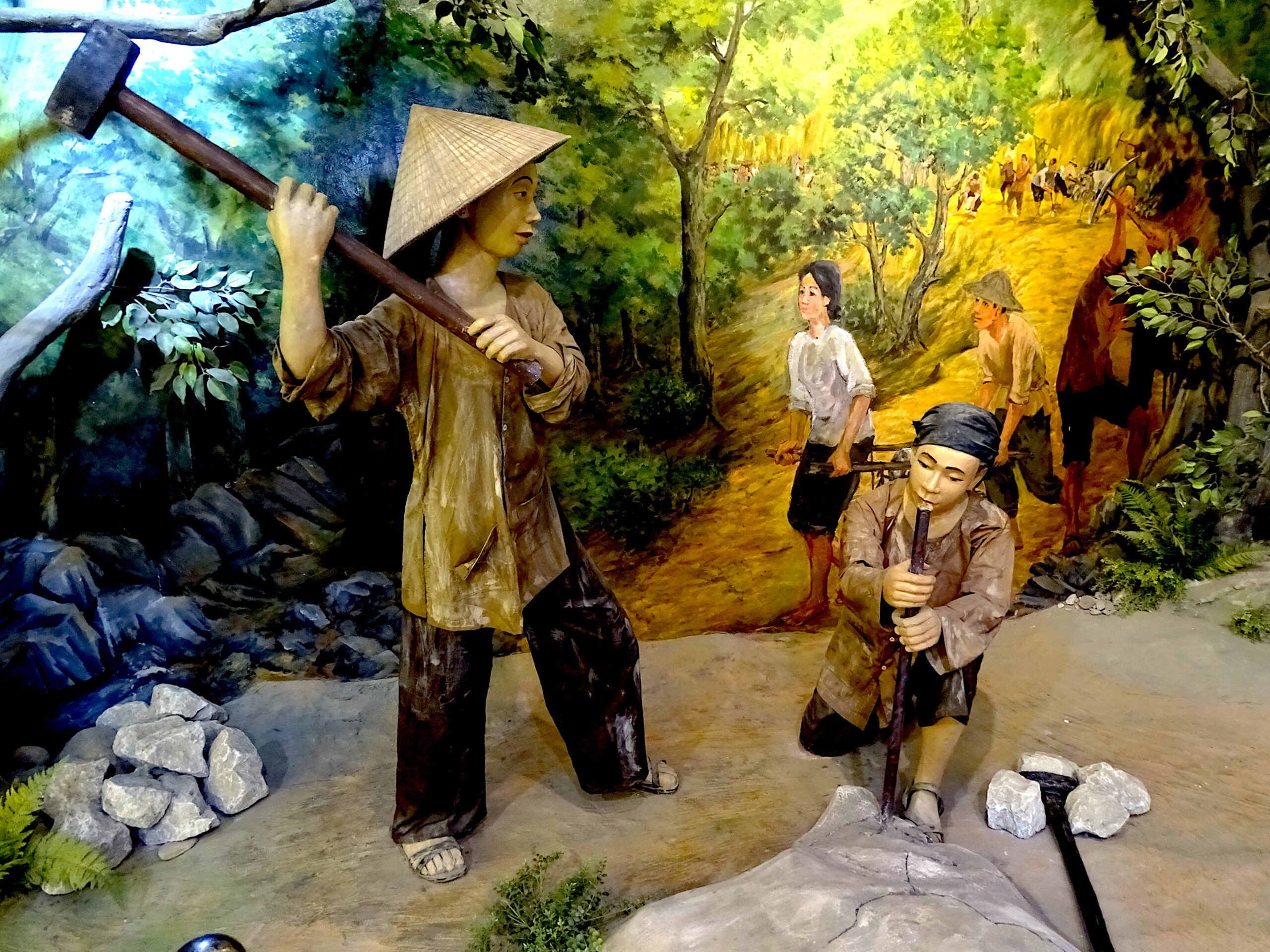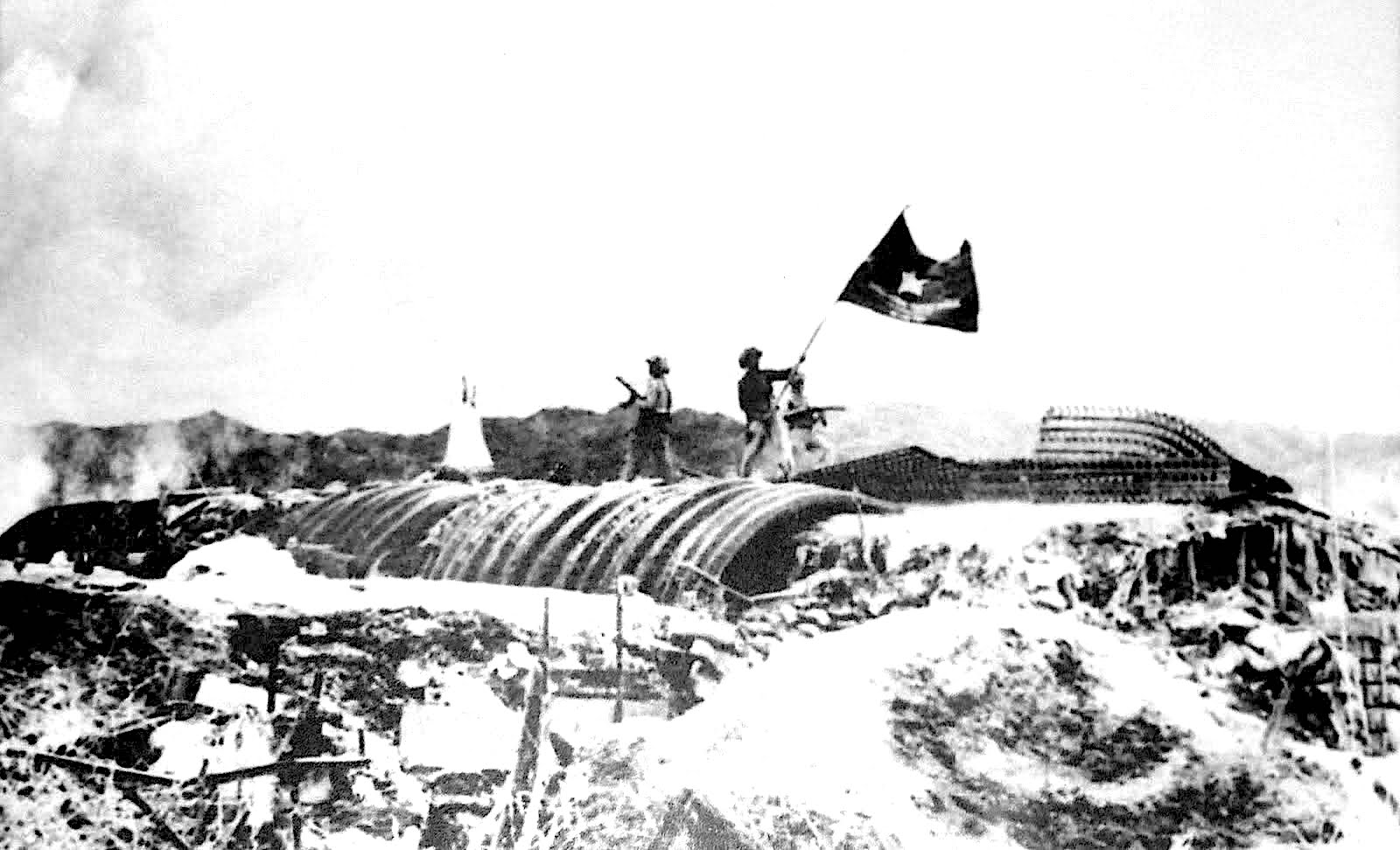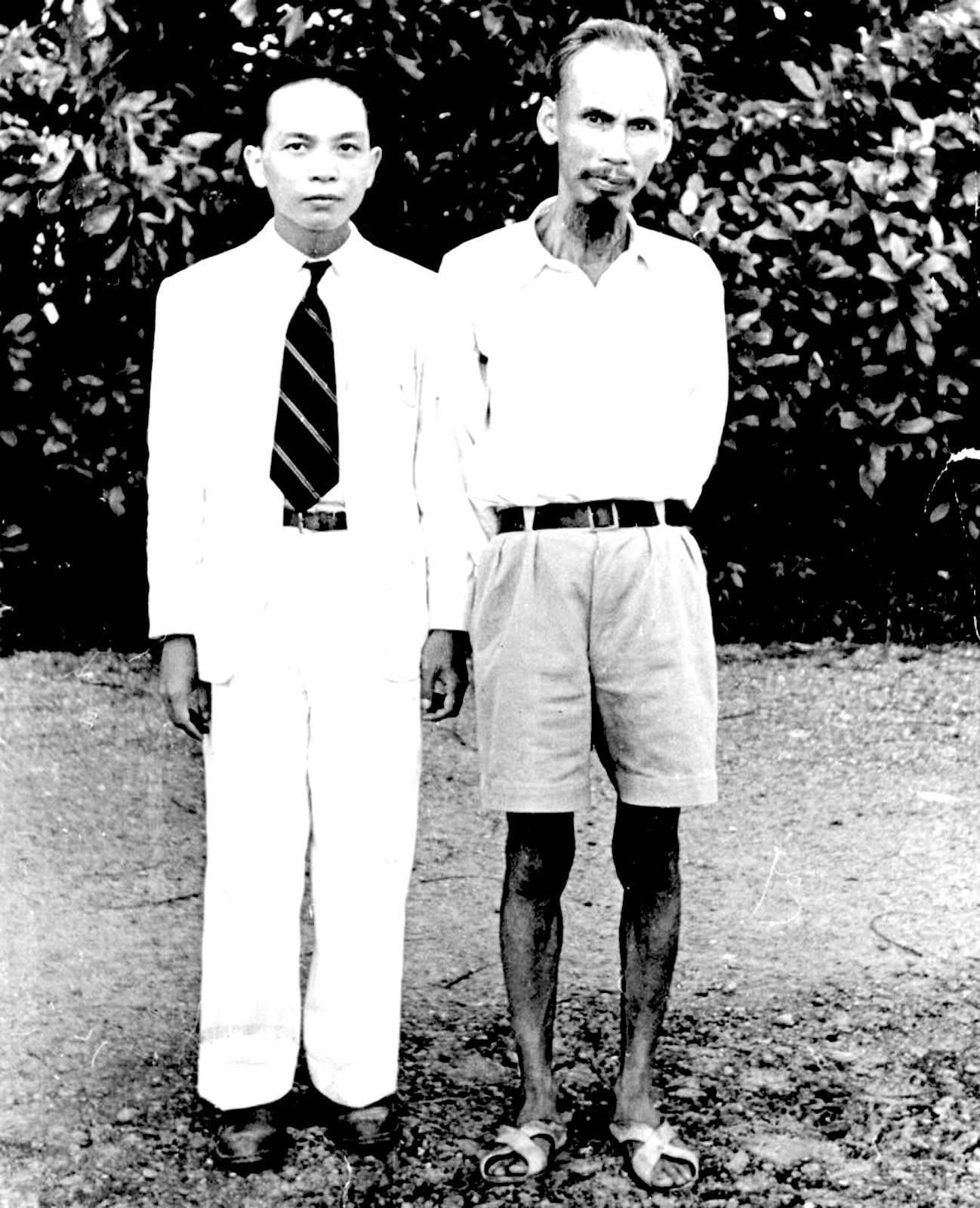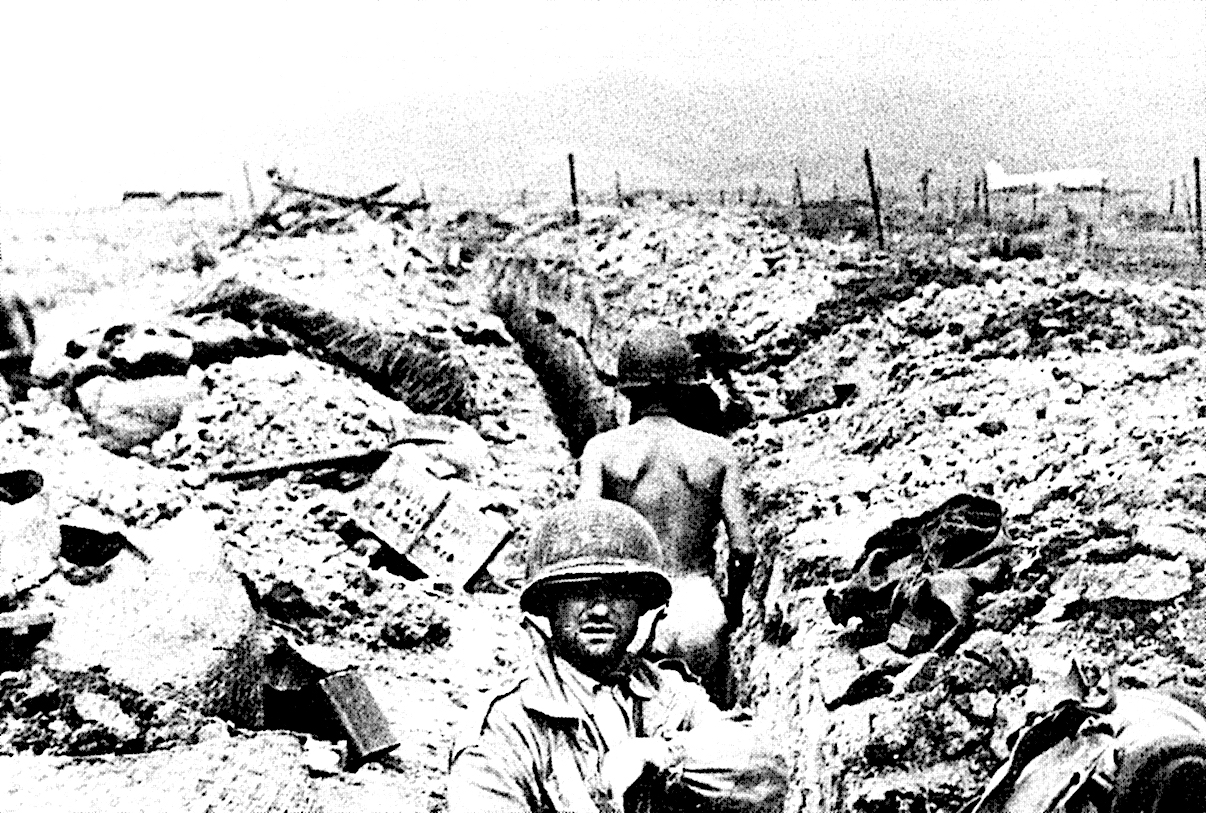How did the Vietnamese prevail at that world-historical moment? The answers shed light on the world we see outside our windows now.

Diorama of Peasants Assisting Struggle at the Dien Bien Phu Victory Museum in Vietnam. (Adam Jones, Wikimedia Commons, CC BY-SA 2.0)
By Patrick Lawrence
Special to Consortium News
 I had the most salutary email the other day, a reviving lift amid these, humanity’s darkest days, surely, in the memory of anyone living. It was from George Burchett, an Australian painter who resides in Hanoi, the city of his birth.
I had the most salutary email the other day, a reviving lift amid these, humanity’s darkest days, surely, in the memory of anyone living. It was from George Burchett, an Australian painter who resides in Hanoi, the city of his birth.
George was born in Hanoi because he is the offspring of Wilfred Burchett, one of the towering greats among 20th century correspondents. Wilfred is celebrated for many things, one of which is his coverage of Vietnam’s anti-imperialist wars, of which there are two, from the North.
And George wanted to remind those who receive his privately distributed newsletter, People’s Information Bureau, that it is time to mark the 70th anniversary of the victory of the Viêt Minh, Ho Chi Minh’s revolutionary movement, over the French at Ðiên Biên Phú, a valley in the remote highlands hard by the Laotian border in northwestern Vietnam.
The battle of Ðiên Biên Phú lasted 55 days, from March 13 to May 7, 1954. Two months after the French were catastrophically defeated they signed the Geneva Accords, wherein they agreed to withdraw all forces not only from Vietnam but also from Cambodia and Laos, France’s other colonial possessions in Indochina.
The Viêt Minh victory at Ðiên Biên Phú makes riveting history all by itself. John Prados, a lately departed friend, wrote my favorite among the many books on the topic. As the French grew desperate, he recounted in The Sky Would Fall (Dial, 1983), the Eisenhower administration made plans to intervene against the Viêt Minh — plans that included America’s second use of atomic bombs.
Eisenhower, the Dulles brothers (John Foster at State, Allen at the C.I.A.), and others never got beyond an extensive but covert operation before the French forces under Christian de Castries went down. But we find in Prados’ book a suggestion of the madness and delusion that started the Second Indochina War and prolonged it for 21 years.
Washington’s policy cliques, not to mention certifiable paranoids such as the Dulles brothers, are incapable of learning anything from anything, so captive are they within our republic’s exceptionalist ideology. The post–Vietnam record of American foreign policy demonstrates this all too amply.
But there are lessons the rest of us can learn from the Vietnamese triumph at Ðiên Biên Phú and its defeat of the Americans in the two decades and a year of war that followed. Let us not miss these for the light they shed on the world we see out our windows and how we should act upon it.
Strategic Genius

Viet Minh troops planting their flag over the captured French headquarters at Dien Bien Phu, May 7, 1954. (Vietnam People’s Army – Wikimedia Commons, Public domain)
General Võ Nguyên Giáp proved himself a strategic genius as he led the Viêt Minh forces to victory at Ðiên Biên Phú. He famously surrounded the French from the hills that enclosed de Castries’ garrison and made full use of guerrilla tactics as he deployed heavy artillery, carefully arranged for maximum impact, in an elaborate system of tunnels to evade French bombardments.
As is recounted in the histories, men and women in Ho’s revolutionary movement had to disassemble Giáp’s heavy guns to transport them, on foot and by bicycle, piece by piece, up the mountains surrounding the French, where they were put back together and into service. Giáp destroyed de Castries’ airstrip and, with heavy ground fighting, steadily reduced the French perimeter until the fighting was bloodily close.
The Viêt Minh had defeated and captured 12,000 surviving French troops in less than two months. Giáp had not lost a single piece of artillery. The French were at the table in Geneva on May 8, a day after de Castries surrendered. A month later the French government fell.
Thomas Meaney, in a brief but very good piece in the New Left Review’s Sidecar section, described Ðiên Biên Phú as “the Stalingrad of decolonization.” For historical perspective it does not get much pithier: Ðiên Biên Phú stands high among the non–West’s first decisive triumphs against the aggressions of the imperial powers during what we call “the independence era.”
How did the Vietnamese prevail at that world-historical moment? In this lies one lesson worth learning.
Meaney, a fellow at the Max Planck Society in Göttingen, Germany, points out that Vietnam’s anniversary celebrations of their victory last week included a full-dress reenactment of the battle, wherein the peasants and enlisted soldiers who hauled all that artillery up the mountains were prominently honored. Why? What were the Vietnamese saluting?
As Meaney rightly explains, the supply lines serving General Giáp were possible because Ho had, by 1954, created a shared identity among the Vietnamese, a common recognition and purpose, that made possible a national mobilization against the French. This was Ho’s sine qua non.

Võ Nguyên Giáp and Ho Chi Minh in 1945. (AP Photo, Wikimedia Commons, Public domain)
“What must we do to realize a Ðiên Biên Phú” Frantz Fanon wondered when he published The Wretched of the Earth seven years later. The answer that should interest those eager to learn from history and experience lies in the peasants and porters. They had a common consciousness, an awareness of who they were, their circumstances, and what they had to do about their circumstances. This enabled them to act.
And that, in turn, is what I mean by a lesson worth learning.
Blanket Indifference to Genocide
When you talk to people day in and day out about the Israeli–U.S. genocide in Gaza, you start to realize that this obscene crisis has pushed in the faces of those who oppose it a very raw reality from which most of us have tended to flinch.
All of the institutions through which citizens of the West are supposed to express their preferences and demands are broken. Among those purporting to lead the Western democracies we find a blanket indifference to those objecting to a genocide they witness daily in real time.
Please Donate to the
Spring Fund Drive!
This is our shared circumstance. If we do not live in functioning democracies, as the West’s support of apartheid Israel makes rudely plain, it is only when we cultivate a common consciousness of this reality — no flinching — that people will know what mountains they have to climb and what they must carry with them.
George Burchett, who has dedicated considerable time over some years to archiving his father’s work, sent the most delightful photographs of Wilfred in the People’s Information Bureau mailing that marked the Ðiên Biên Phú anniversary.
There was Wilfred, in sandals and a pith helmet, working on a piece at Ho’s jungle headquarters in Thai Nguyen Province. In a piece published in Vietnam+, a Hanoi website, you see Wilfred talking to Ho over tea at what looks to me — I could be mistaken — the modest house Ho had built behind the grandiose palace where the colonial governor had lived.
[See: Three Extraordinary Australian Journalists: Burchett, Pilger & Assange]
The two reporters who interviewed George, Phan Hong Nhung and Pham Thu Huong, noted “the spirit of solidarity, self-reliance, the great leadership” abroad in the Vietnam of 1954. I have to say this landed hard, devoid of all three do most Americans seem today.
But George sent something else in his PIB missive that carries another lesson in it.
It is a digitized copy of a piece Wilfred filed on March 30, 1954, headlined, “A Great Disaster for the French Army.” Wilfred was done with the mainstream press by this time. This was his first file from Vietnam for The Daily Worker, the British daily, and marked, if I have this right, his arrival among independent media.
“The action now taking place at Ðiên Biên Phú is the most tragic failure for French arms in the whole disastrous fiasco of the Navarre Plan to crush the people of Viet Nam,” his lead reads. “To the heavy losses in manpower must be added the destruction of French air power which makes this battle one of the costliest of the whole ‘dirty war’ to the French.”

French troops seeking cover in trenches at Ðiên Biên Phú. (Stanley Karnow: Vietnam: A History, The Viking Press, New York 1983, Wikimedia Commons, Public domain)
You wouldn’t read anything like that in The Times of London or The Daily Express, for which Burchett has previously filed, at the end of March 1954.
The battle of Ðiên Biên Phú had begun just two weeks earlier. Burchett’s reference is to Henri Navarre, a professional soldier who was sent from Paris a year earlier to subdue the Vietnamese liberation movement.
Working From the ‘Other Side’
I see another lesson in Wilfred Burchett’s files from North Vietnam, beginning in 1954 and running all the way to the victory in 1975. It is the honor and worth of working from “the other side,” and the difference this can make in the formation of that motivating, mobilizing awareness I previously mentioned among people otherwise propagandized into acquiescent silence.
Burchett’s reports from the North are precisely a case in point. As anyone who lived through the Vietnam years will know, Wilfred’s work was essential to the coherence and determination of the antiwar movement, especially but not only in the U.S. The lesson here is that independent media — print, webcast, podcast, video, audio, all of it — is similarly essential to an informed understanding of events in our time.
(Disclosure at this point. I was fortunate enough to work with Wilfred in the mid–1970s, taking dictation and editing some of his files as the Vietnam war drew to a close. I detailed this relationship in Journalists and Their Shadows, Clarity Press brought out last autumn.)
Last weekend The Floutist, the Substack newsletter I publish and co-edit, posted a piece called “Report from Donbas,” written by a renowned Swiss journalist named Guy Mettan. It is based on a tour Mettan made last month of the two Donbas republics, Donetsk and Lugansk, which voted in referenda two years ago this September to join the Russian Federation.
Mettan’s report shows us a place and a people we are not supposed to see, just as Burchett began to do 70 years ago this spring. Mettan’s piece, another reportage from “the other side,” opened my astonished eyes very wide even as I edited it. And it is precisely another case in point.
Patrick Lawrence, a correspondent abroad for many years, chiefly for The International Herald Tribune, is a columnist, essayist, lecturer and author, most recently of Journalists and Their Shadows, available from Clarity Press or via Amazon. Other books include Time No Longer: Americans After the American Century. His Twitter account, @thefloutist, has been permanently censored.
TO MY READERS. Independent publications and those who write for them reach a moment that is difficult and full of promise all at once. On one hand, we assume ever greater responsibilities in the face of mainstream media’s mounting derelictions. On the other, we have found no sustaining revenue model and so must turn directly to our readers for support. I am committed to independent journalism for the duration: I see no other future for American media. But the path grows steeper, and as it does I need your help. This grows urgent now. In recognition of the commitment to independent journalism, please subscribe to The Floutist, or via my Patreon account.
The views expressed are solely those of the author and may or may not reflect those of Consortium News.
Please Donate to the
Spring Fund Drive!



Clarification for most readers.
PAVN, more commonly know as the NVA, ( North VietnameseArmy) were/are regular army soldiers, not guerillas, like the V. C. (Viet Cong)
Also, a great book (166 pages) of that era is: A Bitter Heritage, subtitled: French Indochina from 1941-1966 by historian Arthur Schlesinger.
That is what happened in Vietnam. The destruction of an entire country which was then “privatized” in the early 1990s:
The military industrial complex of western civilization always wins not matter which side it is, people of the world and innocent women and children not so much. Profiteers swoop in the take advantage of the damage.
hxxps://www.globalresearch.ca/who-won-the-vietnam-war-2/172?utm_source=substack&utm_medium=email
Thanks Patrick Lawrence for a very moving account of the destruction of the French Army and the bravery and commitment of the Viet Minh and Vietnamese Peasants. They fought for their country against the French and Us.
I witnessed the French debacle in the press from afar in the US but then became part of the LBJ debacle with the us obscene war.
Looking back and forward, I have no hope that the US, as an enterprise, will ever become a responsible and humanitarian govt as it has been and is a very much a war mongering enterprise.
How many wars has the us initiated at a result of millions and millions of deaths of innocent civilians, the destruction of nations, and the cost of trillions of dollars?
The author quite appropriately refers to “the Israeli–U.S. genocide in Gaza” rather than covering for Genocide Joe’s cowardly deference to the murderous war criminals of Israel, re tout ce qui concerne la guerre, just because simple cheating may not be enough to get him re-elected to the U.S. presidency this time round–though I suspect that Joe no longer has the mental acuity to realise that his hired cheaters and mundane lies have long since lost most of their effectiveness.
The facts are that Russia is not simply in an unprovoked war with Ukraine, but rather engaged in an existential struggle visited upon it mainly by Washington and its band of servile Nato vassals, as has been the actual reality for at least a dozen years now. The same is true for the conflagration the Palestinians have faced over entire decades and generations by now, not simply versus the Israelis, but against the entire war machine of the United States, inclusive of the hegemon’s full spectrum of economic, diplomatic, propagandistic, industrial, technological and kinetic tools of war.
At least Russia seems able to fight at parity against the entire West that the USA has mobilised against it. The Palestinians face the combined might of this same juggernaut (masquerading as just “Lil’ Ol’ Mom & Pop Israel”) drilling down on one remaining fragment of relict Palestine, about the same size and capabilities of a single rural county in Wyoming or West Virginia, and the “real American” drama queens like Lindsey Graham piss and moan that we aren’t hammering them even harder! In Lindsey’s universe, an abortion to save the life of a pregnant mother must be stopped under force of law, but fragmenting a developing fetus in its mother’s womb with machine gun fire gets a special dispensation from the Christian God.
Brutal truth! Thanks!
Yes, the Eisenhower administration did consider the use of nuclear weapons at Dien Bien Phu
This should remind us all of the urgent need to eliminate nuclear weapons.
In order to stave off defeat, the French government appealed to the USA for help. As a result, the Pentagon drew up a plan that became known as Operation Vulture. This envisaged an attack with 60 B29s and then three nuclear bombs would be dropped.
The Joint Chiefs of Staff, with the exception of General Matthew Ridgeway, all endorsed the plan.
Secretary of State John Foster Dulles, Vice President Nixon and Leader of the Senate Lyndon Johnson all endorsed the plan.
Dulles and Admiral Radford were then sent by President Eisenhower to London and Paris where the plans were rejected by the respective prime ministers.
And so the plan was abandoned. But luck does not last forever. Hence the need to eliminate nuclear weapons.
Thank you Patrick and also to George Burchett. I well remember Wilfrid Burchett and his wonderful work, but also the way the Australian Government treated him. It seems that the west does no learn from its huge errors and destruction of “enemies” and now we see Vietnam as a country sovereign and successful despite our efforts!!
Indeed a giant of real journalismn.
From his (prohibited ) entry into Hirosima reporting on that Holocaust he became a hunted species.He went on the ‘hit list’ when he disclosed US use of Biological Weaponary (Plague Bacteria) in Korea.His independant reporting from the other side caused that so called ruling World order” no end of embarrassment and provoked fury.
He was pursued unmercifully and survived not doubt largely by the help of Uncle Ho & his friends in Vietnam.
His legacy lives on.
Wilfred Burchett reported the Korean War from the North Korean/Chinese side from 1950-53 for the French Communist newspaper, Ce Soir. He extensively interviewed four captured American pilots in 1952 who had confessed to dropping germ war bombs in North Korea and China. Burchett later gave an interview to my father, John W. Powell, editor of the China Weekly Review, in which he stated that the pilots felt betrayed by their officers who had coerced them into flying the bw missions. This story is told in, The Secret Ugly: The Hidden History of US Germ War in Korea, by Thomas Powell.
Burchett later published reports in the National Guardian, the New York-based independent weekly
founded in 1948 by professional journalists James Aronson, Cedric Belfrage and John T. McManus.
Wikipedia says he began writing from Vietnam in 1962, but Patrick’s story suggests it was much earlier.
(Perhaps it wasn’t for the National Guardian until 1962,)
Thank you for introducing me to the work of Guy Mettan. I am sharing it widely along with your report here.
The West’s assessments of Vietnamese realities was clearly irrelevant to them.
They felt they had an opportunity to accomplish something in their interest, and Vietnam provided a convenient setting for it. And if it later developed into something where more bombs were used than were used in WW2 that was irrelevant also.
I learned this in the late 1960s when I was there through an Agency for International Development financed program, involving learning Vietnamese and teaching at the Phu Tho Technical Engineering Institute school near Tan Son Nhut airfield in Saigon.
USA Killing everyone there became a necessity because distrust was endemic, and Vietnamese were enmasse unwilling to fight our battle.
When asked at end of time there 18 of 20 people sent there said, “Pack up and leave now” at the end of 1967.
There are now similarities in this to the war today in Ukraine.
Well done, Mr. Lawrence. What a pleasure to read.
Your point about common understanding is well made. Students worldwide are demonstrating an understanding, and their media habits are outside legacy publications (though still partially corralled, hence the TikTok idiocy).
The US response to their protests at and by the Universities provides two insights. State law enforcement are happy to be involved in political repression, which is not terribly new news. The institutions themselves are invested by/with the Zionist project, which is the key give away. Universities are a prime location for controlling thought, but without controlling media channels or habits they are insufficient.
From there, its history repeating. Uncontrolled media report the repression, others learn of it and the complicity in political repression becomes even more obvious. The final lesson is that most politicians and administrators are stupid, which again, is not terribly new news.
PS: It is always a joy to see Wilfred Burchett’s name in a story.
Great comment. I concur.